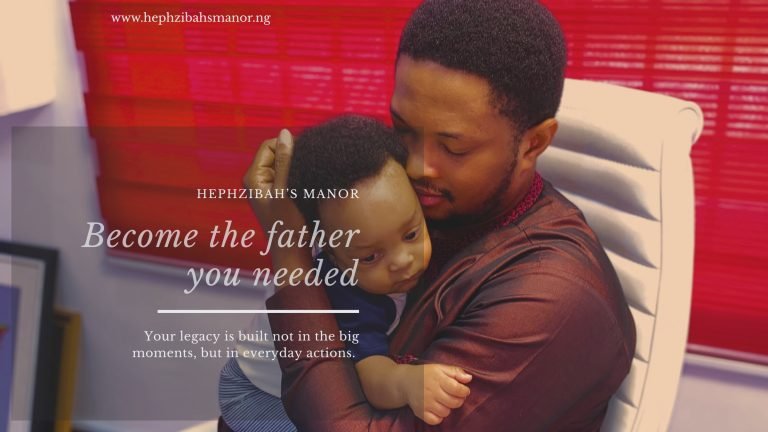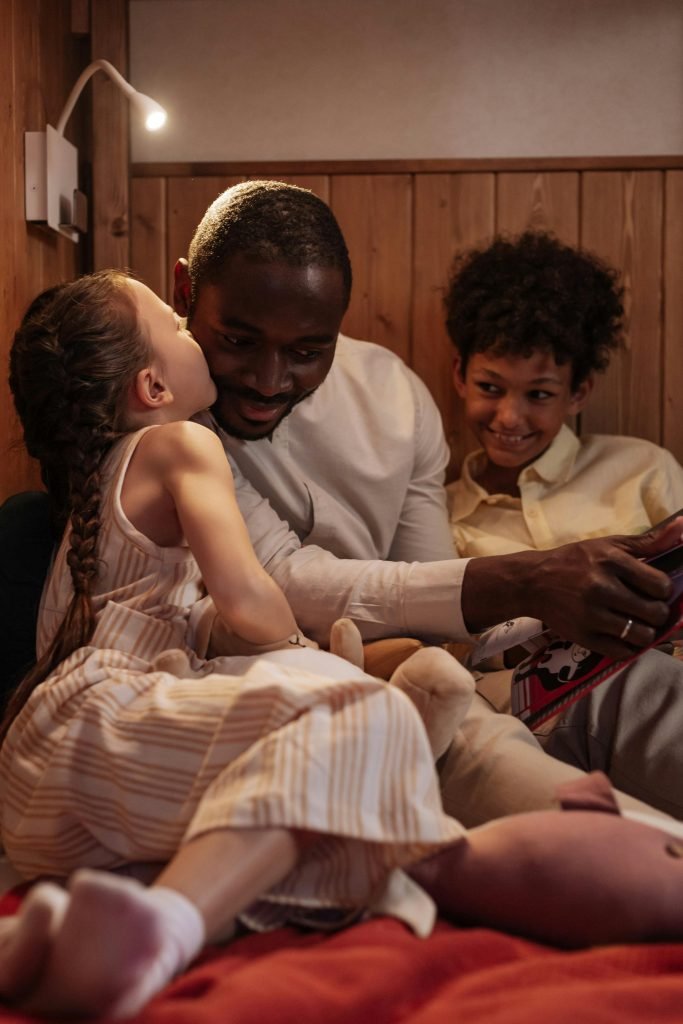As a father, becoming an intentional model doesn’t mean you must be flawless. But it does mean you must be aware.
Legacy is Built in Little Moments
Apologize when you’re wrong. It teaches humility.
Speak kindly to and about your spouse. It teaches honor.
Let your children see you pray. It teaches them surrender.
Serve. Laugh. Protect. Provide.
And let them see you doing it.
The legacy of a father isn’t only written in birthdays or big moments. It’s written in the everyday moments like in the street while buying plantain, under the shed in the rain, on the road when a danfo driver in one of those yellow buses (or a Micra or Keke) cuts you off without warning. I mean, let’s be honest; it takes special grace not to hurl insults in those moments. But it’s doable. I’ve gotten so used to restraining myself that the first thing that slips out now is, “Lord, have mercy!” And on days when I’m really pushed? I just mutter, “Gorimapa!” (That’s Nigerian for bald head; nothing too serious, just something to release the tension 😄).
It’s in the ordinary things that become sacred memories, those little reactions, those seemingly insignificant moments. That’s where the legacy is written. Deuteronomy 6:6–7 shows us that godly parenting is a lifestyle, not just a one time a lecture or a series of order: it says: “Repeat them again and again to your children… Talk about them when you are at home and when you are on the road…”
They’re watching. Learning. Becoming.
What kind of father are you showing them?
Vulnerability Isn’t Bad, ‘Don’t Lock Up’
My dad was tough growing up. Stern. Unapologetically firm. But I saw through his tough exterior. He loved us deeply, even if he didn’t always say it. I knew, without being told, that he worked hard to make sure we were fine.
I may not recall many of the hugs from my later childhood years, but one memory stands out clearly: my sister and I shouting, jumping, and screaming, “Daddy oyoyo, Daddy oyoyo!” the moment we spotted him coming home. We’d run straight to him, eager to jump into his arms. I also remember those road trips, us kneeling on the back seat of the car, shouting, “Daddy, speed! Don’t let them gap you!”
Those moments, filled with laughter and excitement, left a permanent imprint of love on my heart. It’s that love that remains with me, unshakable and enduring, forever.
He wasn’t the most emotionally expressive father, but I saw him. The very few times I saw him cry, it was because he was trying to express his love for us. And I can only imagine how hard that must have been for him.
You see, many African men didn’t grow up watching their fathers be vulnerable. They grew up seeing dads who were strong, but quiet, and emotionally withdrawn. They grew up with heroes, not humans. So they too became fathers who ‘locked up,’ believing that if they just provided, just protected, then that was enough.
But I chose to break that cycle. As a woman who doesn’t remember hearing the words “I love you” from her dad, I decided my children would hear it until it echoed in their bones.
I remember the first time my husband said, “I love you” to me. I couldn’t say it back. Not because I didn’t feel it, I loved him with my whole heart, but because it felt unnecessary. I thought, Why do I have to say it? Can’t I just show it?
But now? I’ve grown. I chose who I want to be
If I had a dollar for every “I love you” I’ve said to my children, I could build a house in Banana Island. Because I chose differently.
1 Corinthians 11:1 says, “Be imitators of me, as I am of Christ.” That verse has become my life motto as a parent. My children are watching me. I want them to imitate love, grace, and strength, not silence and emotional walls.
And part of that has meant learning to let them into my heart, not just through hugs and kisses but also in moments of weakness.
I’m not saying you should go telling your children every single thing that’s wrong or that you’re going through. Wisdom still has its place. But I do believe it’s okay to let them know how you feel sometimes. They’re not too small to understand. And they are definitely not too small to pray.
When I’m not feeling great, physically or emotionally, sometimes I say something like this to my first son, “Mommy is a bit under the weather and needs to rest. Could you please pray for me?” And oh, the excitement that lights up his little face! He jumps at the opportunity. And when he’s done praying, he says, with full confidence and authority, “Mommy, you will be fine, okay? You will soon be better. Just lie down.”
In that moment, he’s not just praying for me, he’s learning empathy, spiritual leadership, compassion, and faith in action. And all of that, just because I made room for him to see that even strong people need God too.
So, yes, I hug my kids so much I sometimes wonder if I’m smothering them a little too much.
For the longest time, I didn’t hear them say “I love you” back. And I won’t lie, I was worried. I questioned myself: am I doing this right? Is it sinking in? Do they even feel it? But then, one day, my first son looked up at me and said those words. Oh dear Lord. My heart melted. It was like every hug, every cuddle, every whispered “I love you” that had gone unanswered had finally come full circle in that one moment.
And it was worth it.
You see, love isn’t just shown. It’s also spoken. And children need both.
They need to see it, and they need to hear it.
Proverbs 16:24 says pleasant words are as a honeycomb, sweet to the soul, and health to the bones.”
Start Anew, Even If You Didn’t Have It
To the father who never got this from his own dad: You can still give it.
Even if you were never hugged, you can become the dad who hugs.
Even if you were never affirmed, you can become the father who affirms.
Even if you never heard “I love you,” you can become the one who says it freely, fully, and often.
Yes, you can give even what you never got from your earthly parents when you allow yourself to receive the love of God, your Heavenly Father.
Ephesians 5:1-2 says, “Be ye therefore followers of God, as dear children; and walk in love, as Christ also hath loved us, and hath given himself for us an offering and a sacrifice to God…”
God is not emotionally distant.
He is not quiet in His affection.
He sings over you.
He calls you “Beloved.” He rejoices over you with joy. (Zephaniah 3:17)
Let God father you so you can learn to father better.
So, dear father, dear expectant dad, what are your children seeing? What are you talking about in your words and deeds?
May your children see Christ in you.❤️






